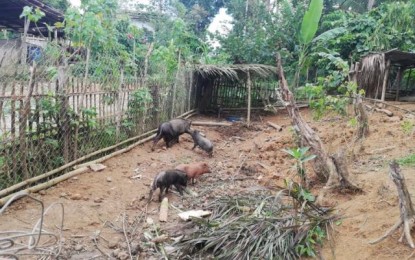
SLOPING FARM. Native pigs are raised in a portion of the four-hectare Concepcion Carillo Agricultural Farm (CFARM) in Barangay Cairohan, Bingawan, Iloilo in this undated photo. With training and support from the Department of Agriculture, the family was able to convert the sloping land area to become productive. (PNA photo by PGLena)
ILOILO CITY – A four-hectare diversified farm in the sloping terrain of Barangay Cairohan, Bingawan, Iloilo shows how to earn from wastes.
“Sixty percent of the farm products go to wastes. They should be processed to be converted into fertilizers and into something that can be exchanged for money. That’s how interesting is organic farming,” Concepcion “Connie” Carillo, owner of the Concepcion Carillo Agricultural Farm (CFARM), said in an interview on Wednesday.
If the farmer will only rely on their production, then they can be losing or have no income at all because the price is fluctuating, she said.
But if they know how to convert, their income could be up to 110 percent, Carillo added.
The 56-year-old agripreneur said it would be difficult to appreciate if one does not stay on a farm. But once you do, you will realize that there are a lot of wastes that can be converted into money.
Currently, among the best sellers of the CFARM are its soil conditioner from compost, bedding spent from piggery (use as an alternative organic fertilizer), organic concoctions and pulp out of fermented plant juice; coconut bonsai from rejected coconut fruits that can be used as decoration; and “panagang” products or herbal oils using natural products that can be found in the farm.
“If we convert wastes into money, we should also look at their benefits to us and the community as a whole,” she said.
Onboard to help her on the farm is her husband, Sancho, and seven children.
They started as a tenant farmer of their 2.4-hectare lot in 1980. It was awarded to them through the Comprehensive Agrarian Reform Program (CARP) in 2000.
Thereafter, they were able to acquire the adjacent farm, expanding their land area to four hectares.
For a time, the farm was left unattended since there was a teaching opportunity for her in the city.
The CFARM was established in 2015 after Super Typhoon Yolanda in 2013 damaged farmlands and crops in Bingawan that led to losses in income and livelihood of farmers.
She trained on Sloping Agricultural Land Technology (SALT) and Integrated Diversified Organic Farming System with the Department of Agriculture.
A big portion of the four-hectare farm is hilly. To avoid erosion, the owner made sure that native trees that are preserved and more trees such as Banyan, Madre de Cacao, Madre de Agua, mulberry, coconut, coffee, bamboo, and fruit trees were planted. Spices, herbs, and herbal trees were also protected and preserved.
It has a fishpond, piggery with odorless pigpen, Guinea fowl, geese farm, quails, rice farm, container garden, and other technologies that can be adopted by farmers.
“The Concepcion Carillo Agricultural Farm inspires farmers with this kind of soil,” she said.
In 2016, the farm was accredited by the Agricultural Training Institute (ATI) as a learning site for organic agriculture and aquaculture and as an extension service provider in Western Visayas the year after.
Carillo, recognized by the ATI as Magsasaka Siyentista in 2017 and by the DA as among the outstanding women farmer in Western Visayas, added the farm offers a lot of opportunities to women farmers, especially this time of the pandemic.
“Farming knows no gender, what is important is you have the passion to do it,” she added.
CFARM was also accredited by the Technical Education and Skills Development Authority (TESDA) as a farm school and by the Department of Tourism as an agri-farm site.
On Dec. 11, 2020, the ATI Western Visayas recognized the CFARM as the most visited farm based on the total number of clients served.
“We are almost at a higher level of farming, especially that the whole agency of the Department of Agriculture does not stop from helping us,” she said, adding that her products are being promoted by the DA in various venues.
“Women farmers should not lose hope. There is a good future that waits for them in agriculture,” she said.
She added that farming has no age limit, but it is best that at a young age, they should learn to love nature.
“The success of farming depends on your love of nature, interest, patience, research or quest of learning and doing more, do some innovations, marketing, agripreneurship and sharing of skills,” Carillo said. (PNA)
